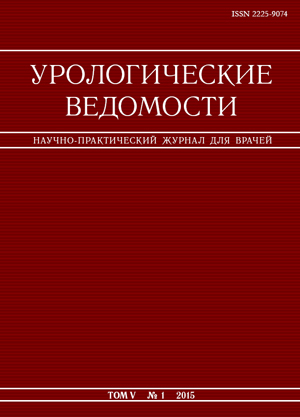Современные методы визуализации рецидивов рака предстательной железы и перспективы их развития
- Авторы: Аль-Шукри С.Х.1, Боровец С.Ю.1, Рыбалов М.А.1
-
Учреждения:
- Первый Санкт-Петербургский государственный медицинский университет им. акад. И. П. Павлова
- Выпуск: Том 5, № 1 (2015)
- Страницы: 7-10
- Раздел: Статьи
- Статья получена: 13.05.2016
- Статья опубликована: 15.03.2015
- URL: https://journals.eco-vector.com/uroved/article/view/2769
- DOI: https://doi.org/10.17816/uroved517-10
- ID: 2769
Цитировать
Полный текст
Аннотация
В данном обзоре рассматриваются современные методы визуализации рецидивов рака предстательной железы и рекомендации по их применению. Оцениваются перспективы развития данных технологий, возможные пути повышения эффективности диагностики.
Ключевые слова
Полный текст
Об авторах
Сальман Хасунович Аль-Шукри
Первый Санкт-Петербургский государственный медицинский университет им. акад. И. П. Павлова
Email: al- shukri@mail.ru
д. м. н., профессор, заведующий кафедрой урологии
Сергей Юрьевич Боровец
Первый Санкт-Петербургский государственный медицинский университет им. акад. И. П. Павлова
Email: sborovets@mail.ru
д. м. н., старший научный сотрудник кафедры урологии
Максим Александрович Рыбалов
Первый Санкт-Петербургский государственный медицинский университет им. акад. И. П. Павловастарший лаборант кафедры урологии
Список литературы
- Picchio M., Briganti A., Fanti S. et al. The role of choline positron emission tomography/computed tomography in the management of patients with prostate-specific antigen progression after radical treatment of prostate cancer // Eur. Urol. 2011. Vol. 59, N 1. P. 51-60.
- von Eyben F. E., Kairemo K. Meta-analysis of (11)C-choline and (18)F-choline PET/CT for management of patients with prostate cancer // Nucl. Med. Commun. 2014. Vol. 35, N 3. P. 221-230.
- Ceci F., Herrmann K., Castellucci P. et al. Impact of 11C-choline PET/CT on clinical decision making in recurrent prostate cancer: results from a retrospective two-centre trial // Eur. J. Nucl. Med. Mol. Imaging. 2014. Vol. 41, N 12. P. 2222-2231.
- Bouchelouche K., Choyke P. L., Capala J. Prostate specific membrane antigen-A target for imaging and therapy with radionuclides // Discov. Med. 2010. Vol. 9, P. 55-61.
- Afshar-Oromieh A., Zechmann C. M., Malcher A. et al. Comparison of PET imaging with a (68)Ga-labelled PSMA ligand and (18)F-choline-based PET/CT for the diagnosis of recurrent prostate cancer//Eur. J. Nucl. Med. Mol. Imaging. 2014. Vol. 41, N 1. P. 11-20.
- Hegde J. V., Mulkern R. V., Panych L. P. et al. Multiparametric MRI of prostate cancer: an update on state-of-the-art techniques and their performance in detecting and localizing prostate cancer // J. Magn. Reson. Imaging. 2013. Vol. 37, N 5. P. 1035-1054.
- Akin O., Gultekin D. H., Vargas H. A. et al. Incremental value of diffusion weighted and dynamic contrast enhanced MRI in the detection of locally recurrent prostate cancer after radiation treatment: preliminary results // Eur. Radiol. 2011. Vol. 21, N 9. P. 1970-1978.
- Donati O. F., Jung S. I., Vargas H. A. et al. Multiparametric prostate MR imaging with T2-weighted, diffusion-weighted, and dynamic contrast-enhanced sequences: are all pulse sequences necessary to detect locally recurrent prostate cancer after radiation therapy? // Radiology. 2013. Vol. 268, N 2 P. 440-450.
- Kitajima K., Murphy R. C., Nathan M. A. et al. Detection of recurrent prostate cancer after radical prostatectomy: comparison of 11C-choline PET/CT with pelvic multiparametric MR imaging with endorectal coil // J. Nucl. Med. 2014. Vol. 55, N 2. P. 223-232.
- Afshar-Oromieh A., Haberkorn U., Schlemmer H. P. et al. Comparison of PET/CT and PET/MRI hybrid systems using a 68Ga-labelled PSMA ligand for the diagnosis of recurrent prostate cancer: initial experience // Eur. J. Nucl. Med. Mol. Imaging. 2014. Vol. 41, N 5. P. 887-897.
Дополнительные файлы









